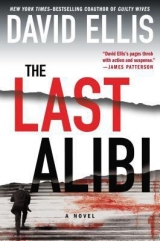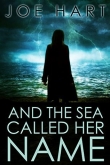
Текст книги "The Last Alibi"
Автор книги: David Ellis
Жанры:
Триллеры
,сообщить о нарушении
Текущая страница: 24 (всего у книги 31 страниц)
When his call was over, Kolarich went to Interview Room Three, where the suspect was sitting with his left hand cuffed to the metal table. Kolarich tended to trust his first vibe, which had been negative, but now he was seeing him up close, and he let it wash over him as he walked in and introduced himself to Marshall Rivers. Rivers was wearing a plain white T-shirt, torn and straining against his muscular upper body. His head was freshly shaved, and he wore a goatee. He had a bad complexion and eyes that screamed out at Kolarich. Menacing—that word stayed with him. This man was bad. Trouble. He wore a dull expression, but those predatory eyes gave him away. The kind of guy who could part a sidewalk of pedestrians just by walking in a straight line.
Three women, Kolarich thought to himself. The first one, the case was pleaded out; the second time, the woman was scared off.
He didn’t want to miss the third time.
“You need anything, Marshall?” he asked. “Take a piss, cup of water, cigarette?”
He hoped that Marshall smoked, or chewed tobacco, something that Kolarich would do, too, if so. It formed a bond, a small thing, but meaningful.
Rivers shook his head but didn’t speak. A smirk played on his face. A tough guy. Not afraid of nothin’.
Kolarich eyed the tattoo on Marshall’s forearm. It ran all the way from elbow to wrist, a bloodred dagger with a black snake curled around it, a multipronged tongue hissing out of the viper’s mouth. His mother must be so proud.
“I was disappointed to learn you went to Annunzio for school,” said Kolarich. He pointed to himself. “Bonaventure.”
Rivers watched him a moment, then showed his teeth. “Bon-Bons, huh? Too bad for you.”
Rival south-side high schools. It was time to play south-side geography: Which parish did you attend, which place did you go for kraut dogs, which bar was your favorite, Lucky Joe’s or the Green Castle? It loosened Marshall’s tongue. Gotta get that tongue loose first.
“You don’t live near Annunzio anymore,” Kolarich noted.
“Nah. Not the same place no more. I like burgers more than tacos, know what I mean?”
“Tell me fuckin’ about it.” Kolarich rolled his eyes and spoke out of the side of his mouth. “You been by Leland Park anytime lately? I think English is the second language down there now.”
Rivers liked that. He liked that a lot. It seemed to Kolarich like the right way to break through with this guy. People who didn’t amount to a whole lot, like Rivers, tended to blame other things for their troubles, principal among them the shifting demographics. There were lots of good, decent people on the city’s south side, but it was just like any other neighborhood—there were plenty of assholes, too. Marshall Rivers was one of them.
And Kolarich was a chameleon. When his goal was to connect with a suspect—and it usually was—he could flip a switch inside himself. He had actually fallen pretty hard for a Mexican girl at Bonaventure, a sophomore named Tina who never gave him the time of day, but at this moment, Kolarich forgot all about her.
“Anyway.” Kolarich jabbed a thumb at the door. “This mexicana? I’m sorry, this Latina girl, excuse me.” He shook his head. “Seems like a nice girl, but I swear to God, she doesn’t speak two words of English.” He chuckled. He put out his hands. “Best I can understand her, she says you confronted her and tried to get her into a car. Is that true?”
Rivers froze up. “Nah, man, that ain’t what happened at all. That chick, she waves at me for directions, see, so I pull over the car, and then she asks me if I want a little sucky-sucky. I said no fuckin’ thanks.”
Kolarich expelled a short breath, a small laugh, and covered his eyes with his hand in bemusement. It was about what he expected from Rivers, who’d had several hours to come up with that tale. Yeah, he thought to himself, that’s why an illegal immigrant would run to the cops, the last people in the world she ever wants to see. Because a potential john turned down her offer of a blow job while she was carrying her baby in a pouch.
“That’s about what I figured.” Kolarich put his hands flat on the table. “For Christ’s sake. Why am I not surprised?”
Rivers, still a bit wary but loosening up, showed his teeth again, a shark baring his fangs.
Kolarich threw up his arms as if agitated. “You know what? Fuck this,” he said. “I’m not going to screw up your life based on the word of some chiquita who probably doesn’t have her green card and can’t even bother to learn our language. I’m not going to do it. I don’t care. I’m not. So forget that, Marshall. I’m not pursuing that.”
Rivers watched him, his eyes intense, cautiously appraising the prosecutor. “You’re serious?”
“Yeah, I’m serious. I’m not charging you on that.” Kolarich flicked his wrist, a straight line in the air. “That’s done.”
Rivers nodded, sitting back in his chair, still cautious but getting looser and looser by the minute. This guy’s all right, he must have been thinking. “I appreciate that, man.”
“The gun, though.” Kolarich knifed a hand onto the table. “Coppers saw you toss the gun. That’s not on the immigrant girl. That’s got nothing to do with her.”
“I didn’t toss no gun.”
Kolarich raised a hand. “Here’s my problem. I have to clear this case, right? This is a case, with a number assigned to it, that needs a resolution, or someone’s going to be all over me asking why the fuck there’s no ‘solve’ next to it.”
Rivers didn’t speak. Kolarich fell back against his chair, his eyes on the ceiling. Then he made a face, tilted his head back and forth, all like he was pondering how to get around this thing.
He came forward again, elbows on the table. “Let me ask you, off the record. Not quoting you, nobody but you and me. It is your gun?”
“Nah, man. Not my gun.” Rivers closed his arms in on himself. He was tightening up, becoming defensive. Kolarich would lose him if he wasn’t careful.
“Okay.” He clapped his hands together. “This is going to turn into a case, then. Because I got two coppers who say you tossed it from the car.” He jabbed his thumb at the door. “You get that? I can shit-can this part about the Mexican girl, because the coppers, they didn’t see that with their own eyes. I’ll tell them that I don’t believe the girl, and that’s that. But the gun? If I go out there and say, no, he denies it, they’re going to insist that you be charged, because you’re calling them liars. They can’t have that. They can’t have a file that says they lied. Know what I mean?”
He thought that Rivers could follow that. It all made sense.
“So then you go to trial, Marshall. You go to trial, and it’s you against two decorated police officers.”
Rivers ran his tongue over the inside of his cheek. His foot tapped the floor like a drummer on too much caffeine.
“S’posin’ it was my gun,” he said. “Just . . . s’posin’.”
“Well.” Kolarich put out his hands. “If you tell me it’s your gun, if you put that in writing, I can agree not to charge you. The cops, they don’t give a fuck about what happens to you after the arrest. They just want their arrest to be righteous. They don’t want anyone saying they fucked up. So, yeah—you admit it was yours, and you agree to give up the gun—can you do that, surrender the gun?”
“Fuck.” Rivers flipped a hand. If it got him a pass, he’d hand that pistol over to God Himself.
“Okay, so nobody’s calling the cops liars, I make the decision not to prosecute you, and we get another gun off the street.”
Rivers pointed at him, animated now, seeing real hope for the first time. “And you put it in writing, too.”
Kolarich smiled. “You’re a smart man. Yeah, of course I will. In fact, I’ll write it first, so you know I’m being straight.”
Kolarich slid the notepad over in front of him and removed the Bic pen from his pocket.
In exchange for the statement below, the county attorney’s office agrees not to prosecute Marshall Rivers in state court for unlawful use of a weapon or for any other firearms charge and will transfer this matter in accordance with Operation Safe Streets. Mr. Rivers acknowledges that he’s been made aware of his rights pursuant to Miranda v. Arizona.
Kolarich signed his name below the words and drew a signature line for Marshall Rivers, too. “There,” he said, sliding the notepad across to Rivers.
Rivers read it over, then looked up at Kolarich. “What’s that mean, a ‘transfer’?”
“It means I’m going to close the file,” said Kolarich. “I ‘transfer’ it from an ‘active’ case to a ‘closed’ case.”
Rivers looked down at the paper again. “And what’s this Oper—”
“Operation Safe Streets is our program for getting guns off the street. If you bring in a gun, we take it, no questions asked. That’s why I can do this, Marshall. That’s why I can give you a pass. Because you’re giving up the gun.”
The best lies, in Kolarich’s experience, had some truth interwoven. There had, truly, been programs like that in the past, sponsored by the city police department. Most people had heard of them, presumably Marshall included. Bring in your gun, we’ll take it off your hands, you walk away, no hassle.
But it wasn’t called Operation Safe Streets.
Rivers scratched at his face. “Should I get a lawyer?”
“That’s absolutely your right,” said Kolarich. “Might not be a bad idea. You want a lawyer to look at it, no problem.” He checked his watch. “Shit,” he said.
“What?”
Kolarich tapped his watch. There was a clock on the wall as well. “This time of night, there isn’t a public defender around. You can sleep in a cell downstairs and they’ll have one for you, maybe, noon tomorrow. Another twelve, thirteen hours. It’s absolutely your right,” he repeated. “Plus . . . well . . .” Kolarich grimaced.
“What?”
“Well, the coppers again.” Kolarich leaned his head on a hand. “Can I just say this? Cops are a pain in the ass.”
“What about ’em?”
Kolarich sighed. “The two cops that pinched you, they have to stay here until this is closed. They’ll have to stay here all night. I’m just worried that, if I make them wait, they’re going to say to me, Why not just charge Marshall so we can all go home? For them, that’s the easiest outcome. They just want me to sign off on a charge of unlawful use of a weapon so they can go home.” Kolarich sighed again. “Which, I suppose, is the easier thing to do, now that I’m thinking—”
“No, no.” Rivers waved his hands. “I wanna go home, too, right?”
Kolarich shrugged. “Yeah, we all do. But you definitely have the right to a lawyer—”
“Nah, nah. I get what this says. I get it.”
Rivers picked up his pen and started writing. He signed it in both places, next to Kolarich’s signature on the prefatory language and at the bottom after his written statement.
“Great,” said Kolarich after reading the statement. “You’ll be out of here in ten minutes, Marshall.” He extended a hand, and Rivers shook it.
“Appreciate that, man. Y’know, all of this.”
“No worries.”
Kolarich left the room with the piece of paper and walked into the squad room. Walking out of the kitchen was Steve Glockner, the assistant public defender assigned to the station house, holding a cup of coffee.
“Hey, Jason,” he said. “What’s up?”
“Not much. You?”
Glockner sighed. “Busy night. Sometimes I wish some of these mutts wouldn’t invoke.”
Glockner was prone to the occasional off-color remark about his clientele, but deep down he was a true believer in the Bill of Rights. Working inside this station house on a crazy multiple-day shift like Kolarich, but on the other side of the equation, he mainly wanted to make sure suspects didn’t confess without speaking to him first. But first they had to invoke, they had to utter those magical words: I want a lawyer. Until then, a public defender had no role in the process.
Kolarich put a hand on his shoulder. “The right to an attorney is inviolate,” he said. “Sacred. Cherished.”
Glockner gestured absently toward the interrogation rooms. “I heard someone came in on an attempted kidnapping?”
Kolarich made a face. “Didn’t pan out. Dropping that charge.”
Glockner put his face in the steam of the coffee. He was just as tired as Kolarich. “Score one for the bad guys,” he said.
When Glockner left, Kolarich looked around the squad room and had no difficulty finding his man. He looked like a bank manager in his suit.
“Mr. Kolarich?”
“Agent Drew?”
Special Agent Frank Drew was working the late-duty shift tonight for the FBI. He extended a hand to Kolarich. “Romie says you’re good people.”
Kolarich shook it. “What did he really say?”
Drew laughed. “He said he owes you.”
Patrick Romer was an assistant United States attorney who had worked with Kolarich on a joint state-federal drug operation last year. Kolarich had helped him beyond what was necessary, including helping a recalcitrant witness modify his attitude.
“This guy, Rivers, has one prior gun violation,” said Drew. “We usually want more than that for Safe Streets.”
Operation Safe Streets was a program launched by the U.S. Attorney’s Office that scooped eligible firearms cases from local law enforcement so that the cases could be prosecuted in federal court, where the penalties for repeat gun offenses could reach the double digits in years. Typically, they found offenders with multiple gun violations on their records and put them away for ten to fifteen years in federal prison.
“This is his third time using a gun,” said Kolarich. “He pleaded down the first one, so he only shows one gun violation. But it’s really two. Tonight is his third.”
“Only counts as two. You know that.”
“He’s a bad guy, Agent Drew.”
“Still.”
“Still, what? He attacks women. He’s evil, this guy. And anyway, is this your call?”
Drew smiled. “You know it’s not.”
“Romie authorized this,” said Kolarich. “He said if I got a confession, he’d authorize it. Well, I got a confession.”
Gun-toss cases could be tricky, Patrick Romer had told Kolarich over the phone. It’s one thing to find the gun on his person, another to find it on the street and say that you saw him toss it. A gun toss and only one prior gun conviction? he’d said. But Kolarich pushed the matter hard, and Romer finally got tired of listening to him. Get me a confession, Romer had said. You get me a confession, and we’ll prosecute.
“Romie authorized it,” Drew agreed. “I’m just saying, you won’t get fifteen years for this. Maybe ten, more like six or seven if he pleads—”
“Yeah, and we prosecute him in state court, it’ll be, like, two or three, probably. This guy attacks women, Agent Drew. This is his third victim. I’ll take six years over two any day.”
Drew wagged the file in his hand. “Speaking of women. What about this witness? Caridad . . . Flores?”
Kolarich shook his head. “Dead end.”
“Dead end? Let me talk to her. She saw the gun.”
“No,” said Kolarich. “The cops saw the gun.”
“It says in this report she saw the gun. It says he stuck it in her baby’s face.”
“The report’s wrong. She didn’t.”
Drew didn’t look satisfied.
“You have two cops that saw the gun toss, Agent. And now you have a signed statement. That’s more than enough.”
“Where is Caridad Flores?” asked Agent Drew.
She was about twenty yards away from them.
“She’s in the wind,” said Kolarich. “She’s worthless. Isn’t really sure what she saw. You don’t need her, anyway.”
Drew’s lips bunched up. He read the statement and looked up at Kolarich. “By any chance would you know the immigration status of Ms. Flores?”
“Didn’t ask,” said Kolarich. “But I’ll tell you this, Agent Drew: If she’s undocumented, then she was pretty damn brave to run to the cops, wasn’t she? I’d call that heroic, wouldn’t you?”
Agent Drew studied him, maintaining that poker face they teach at Quantico, before releasing a sigh. “Fine,” he said. He removed a pair of handcuffs from his belt. “So where’s our guest of honor?”
“Better he hears it from me,” said Kolarich. “Give me one minute, then come in.”
Kolarich unlocked the interview room and found Marshall Rivers with his elbows on the table, his feet tapping a beat. He used the key to unlock the handcuff that tied Rivers’s wrist to the table.
“So I get to leave?” Marshall asked.
“You get to leave here. But you’re not going home, Marshall. You’re being taken into federal custody for unlawful possession of a weapon.”
Kolarich stood back. Marshall Rivers got to his feet and rubbed his unshackled wrist. “What?”
“You’re going to be prosecuted in federal court. You’ll receive four or five times the sentence you would’ve gotten in state court. How does that sound?”
“You lied to me?” Marshall’s chest rose and fell, the venomous hatred returning to his eyes. He lunged for Kolarich, his hands aiming for his throat. Kolarich brought his hands underneath Marshall’s arms, divided them, and stood Rivers up with a double forearm shiver. Then he drove Rivers backward, feeling the crunch of his body against drywall, the clacking of his teeth, the air escaping Rivers like a cushion. Kolarich grabbed his shirt, propping him up.
“Now you know how it feels to pick on someone your own size,” Kolarich whispered, “instead of a teenage girl.”
“I’ll . . . remember this,” Rivers managed through gritted teeth. “You don’t know me.”
Kolarich flipped him around so Rivers’s face was planted in the wall, twisting one arm behind his back. “I know all I need to know,” he said. “You’re nobody to me, Marshall. You get that? You’re a fucking stain on the bottom of my shoe. I’ll forget you as soon as you’re gone.”
That last part was probably true. There was little original about Marshall Rivers. There were plenty of guys like him, and there’d be more to come. And this little stunt Kolarich pulled, yes, was probably over the line, but he was planning on losing absolutely zero sleep over it.
The door to the interview room opened. “Jesus!” Agent Drew shouted. He rushed over to the corner, where Kolarich had Marshall Rivers pinned to the wall. Drew cuffed him quickly and placed a hand between his shoulder blades. “There’s a protocol for a prisoner transfer,” he said to Kolarich. “You’re not supposed to uncuff him while I’m outside the room, for Christ’s sake.”
“That’s why I like this job,” Kolarich answered, straightening his tie. “You learn something new every day.”
Kolarich left the room and walked back down the hall to the squad room. Marshall Rivers bellowed behind him, his protests slowly fading as he was escorted down the stairs and out to the FBI car waiting for him.
Lisa the translator caught up with Kolarich as he entered the squad room. “What do I tell Caridad?” she asked.
“Tell her to go home and forget she ever met us. Tell her the bad guy’s going away for a long time and we won’t be needing her.”
He felt Lisa’s hand on his shoulder. “You’re a good egg, Charlie Brown.”
“Counselor.” The lieutenant stuck his head out his office door and nodded at Kolarich. “We have a double homicide in Cowan Park. Rosen will take you.”
Probably a gang shooting. It would consume the next twenty-four hours of his life, at a minimum. Kolarich rolled his neck, took a breath, and nodded.
“I’m on it,” he said.
PEOPLE VS. JASON KOLARICH
TRIAL, DAY 4
Thursday, December 12
91.
Shauna
Judge Bialek denies my motion for a directed verdict after the close of the prosecution’s case, refusing to throw out the charges against Jason for lack of evidence. She gave me more than my allotted fifteen minutes to argue the motion, which was charitable of her, because she was no more likely to toss this case than she was to sprout wings and fly out of the courtroom. After breaking the bad news to me, the judge summons the jury.
“Is the defense prepared to call its first witness?”
For the first time in the trial, Bradley John rises to address the court.
“The defense calls Jason Kolarich,” he says.
Everyone takes note of Bradley’s sudden participation—the judge with a double blink of her eyes, Roger Ogren with a rifle-quick jerk of the head, the jurors with more casual looks of surprise, not having any firsthand investment in the case.
The biggest witness in the case, and the second-chair attorney, who has yet to speak before the jury, handling him? It was a mutual decision made between Jason and me. His idea, primarily, but I went along with it. A lawyer cannot knowingly suborn perjury, cannot question a witness on the stand if she knows he’s lying. Bradley, on the other hand, does not know everything I know, and in fact does not know with any certainty, one way or the other, whether the testimony Jason is about to give will be the truth, the whole truth, and nothing but the truth.
But I’d be lying to myself if I said this was all about ethics. As artificial and staged and thoroughly rehearsed as this conversation he and Bradley are about to have may be, it is a conversation nonetheless. Jason doesn’t want to have to answer these questions from me. He is afraid of how I will react. And maybe how he’ll react, too.
Bradley organizes his notes while Jason takes the witness stand and is sworn in. After giving his name for the record, Bradley cuts to it.
“Jason,” he says, “did you murder Alexa Himmel?”
“No, I did not.”
“Did you have anything to do with her murder?”
“No, I did not.”
Jason likes to say he is the son of a con artist, which is true, and he likes to say he can bullshit with the best of them, also true. But there is an earnestness to the way he answers these questions, no flash or sizzle, no overwrought emotional appeal, not even a puppy-dog face for the jury, that works. I think it works. I’m doing my best to retain a clinical perspective, a lawyer’s objectivity, to view this through the eyes of the jury and not from my own memories.
“You watched segments of your interrogation with Detective Cromartie?”
“Yes, I did.”
“You heard the testimony about your handgun, the prints being wiped off?”
“Yes.”
“You heard the testimony about the e-mails Ms. Himmel sent you and the many phone calls she made to you in the days leading up to her death?”
“I heard it all. And I have to say, if all I knew about the case was the evidence the prosecution has shown the jury, I’d probably think I was guilty, too. But I’m not guilty. I didn’t kill her.”
“Will you address this evidence with me today?”
“I’ve been waiting all week.”
“Do you know who did kill Ms. Himmel?”
“I believe I do, yes. I didn’t, when the police questioned me, but I do now.”
Roger Ogren stiffens in his chair.
“Will you discuss that with me today, as well?”
“Yes, I will.”
The jury is at full attention. This is Jason’s one chance. The evidence against him has been pretty solid. The jury has to be leaning toward conviction, if they aren’t all the way in, hip-deep, by now.
Bradley peeks at his notes. “Okay, then, let’s get to it,” he says.








